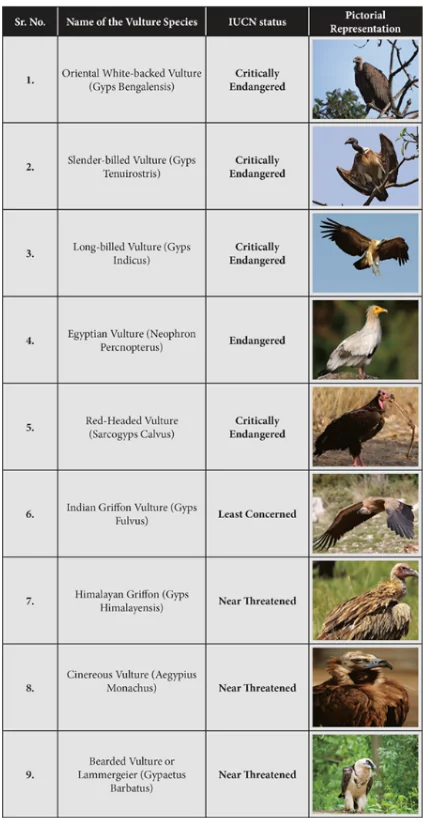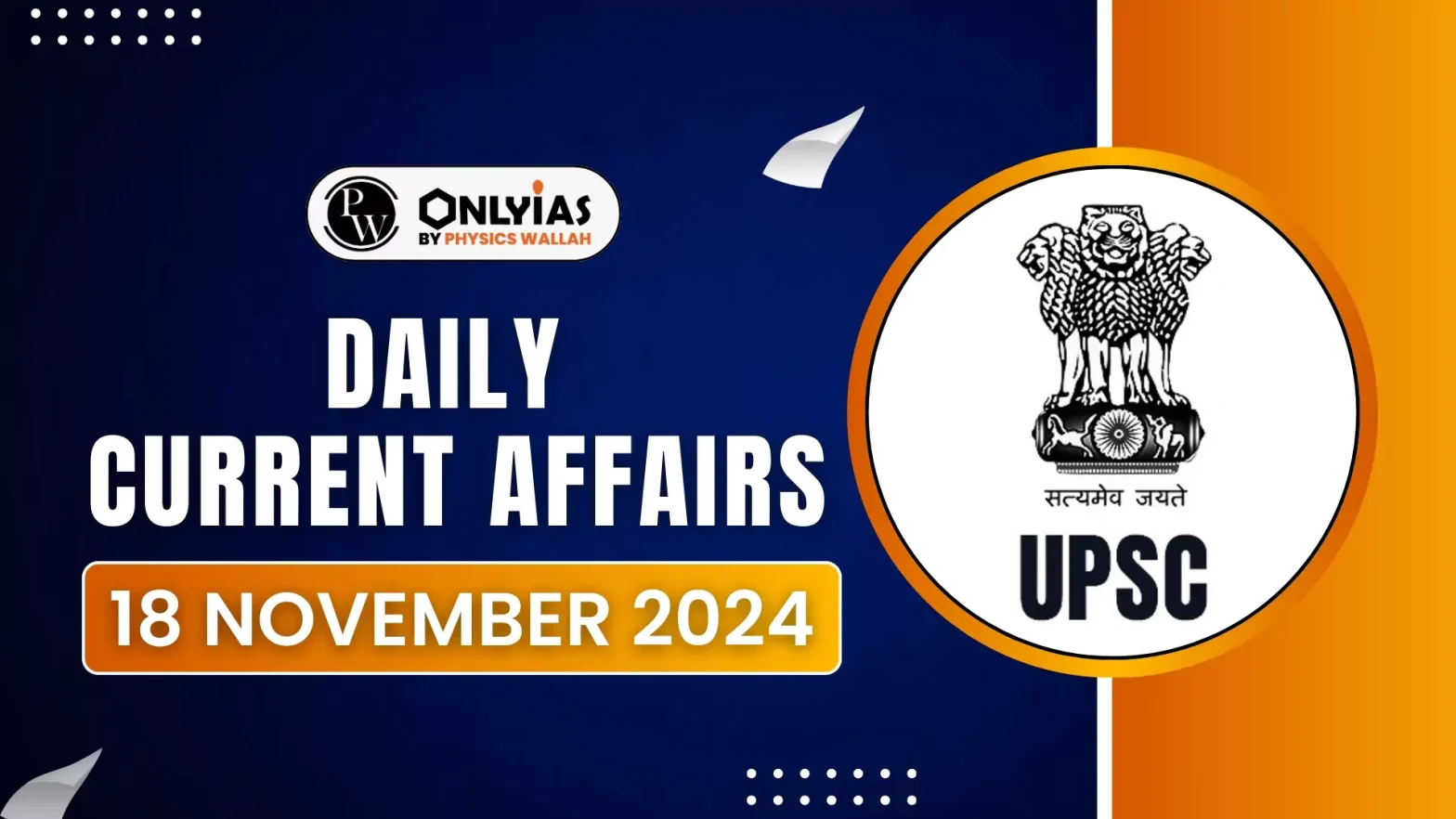In a remarkable first, the critically endangered Red Headed Vulture has been sighted in Kasaragod, Kerala marking a significant addition to the region’s avian biodiversity.
About Red Headed Vulture

- They are also known as the “Asian King Vulture or Pondicherry Vulture”.
- It is one of the 9 vulture species found in India.
- +Appearance:
- Dark, medium-sized vulture with a bare reddish head and neck flaps.
- Weighs approximately 5 kg, average length over 80 cm.
- Primarily solitary; seen alone or with a mate.
- Black plumage with a distinctive white patch on the abdomen, visible during flight.
- Distribution: they are found in Central India, Nepal, Myanmar, Thailand, Vietnam, and parts of Kerala, Karnataka, and Tamil Nadu.
- Breeding: Breeding takes place between November and January.
- Conservation Status:
- IUCN Red List: Critically Endangered.
- Wildlife Protection Act, 1972: Listed under Schedule 1.
- CITES Status: Appendix II
About Vultures in India
- India is home to nine species of vultures, which are categorised as either resident or migratory:
- Resident species: White-rumped vulture, Indian vulture, slender-billed vulture, red-headed vulture, bearded vulture, and Egyptian vulture
- Migratory species: Cinereous vulture, griffon vulture, and Himalayan vulture
- The conservation status of these species varies, with some being critically endangered and others near threatened:
- Critically endangered: White-rumped vulture, slender-billed vulture, long-billed vulture, and red-headed vulture
- Endangered: Egyptian vulture
- Near threatened: Himalayan griffon, cinereous vulture, and bearded vulture
- Decline in population: Vulture populations have seen a steep decline across South Asia, especially in India, Pakistan, and Nepal.
- The primary cause of this decline, occurring in the late 1990s and early 2000s, was the widespread use of the veterinary drug diclofenac, which is toxic to vultures.
Enroll now for UPSC Online Course
Threat faced by Vultures in India
- Poisoning:
- Use of Veterinary Drugs: The extensive use of veterinary drugs like diclofenac, ketoprofen, and aceclofenac during the late 20th century has severely impacted vulture populations.
- Toxic Effects: These drugs, used to treat livestock pain and inflammation, are lethal to vultures that consume the carcasses of treated animals.
- Diclofenac’s Impact: Diclofenac specifically leads to fatal kidney failure in vultures; similar effects have been observed with ketoprofen and aceclofenac.
- Pesticide Contamination: Vultures often consume carcasses contaminated with pesticides or other toxins.
- Lead Poisoning: Vultures feeding on animals shot with lead ammunition can suffer from fatal lead poisoning, contributing further to population declines.
- Habitat Loss
- Urbanization and Deforestation: The expansion of urban areas, deforestation, and agricultural development have resulted in significant habitat loss.
- Impact on Nesting Sites: Destruction of nesting and roosting sites, as well as food sources, poses a challenge to vulture survival.
- Collisions with Infrastructure
- Vulnerability: Vultures are prone to collisions with power lines, wind turbines, and other man-made structures.
- Resulting Injuries and Deaths: Such incidents lead to injuries or fatalities, further reducing their numbers.
- Poaching and Hunting:
- Cultural Beliefs and Wildlife Trade: In some regions, vultures are hunted due to cultural practices or illegal wildlife trade, exacerbating their decline.
- Diseases:
- Avian Diseases: Outbreaks of diseases like avian pox and avian flu can severely impact vulture populations, adding to the reduction in their numbers.
Vulture Conservation Efforts in India
- Addressing Drug Threats
- Diclofenac Ban: India banned the veterinary use of diclofenac in 2006 to prevent vulture deaths from kidney failure due to contaminated carcasses.
- Vulture Action Plan 2020-25: Launched by the Ministry for Environment, Forests, and Climate Change to minimize diclofenac use and prevent contamination of vulture food sources.
- Extended Ban: In August 2023, the use of ketoprofen and aceclofenac was also banned for veterinary purposes to safeguard vultures.
- Captive Breeding and Reintroduction
- Vulture Conservation Breeding Centres (VCBCs): India established a network of breeding centres, the first of which was set up in Pinjore, Haryana, in 2001.
- Centre Network: Currently, there are nine VCBCs, with three managed by the Bombay Natural History Society (BNHS), focused on raising vulture populations for release into the wild.
- Jatayu Conservation and Breeding Centre: The Jatayu Conservation and Breeding Centre, was inaugurated in September , 2024 in Bharivaisi, Gorakhpur Forest Division, Uttar Pradesh.
- Sanctuaries:
- India’s only vulture sanctuary is located in Ramanagara, Karnataka, and is called the Ramadevarabetta Vulture Sanctuary.
- Vulture Restaurant Initiative
- Safe Feeding Sites: A ‘Vulture Restaurant’ was set up in Jharkhand’s Koderma district to provide uncontaminated food sources and mitigate the impact of toxic livestock drugs.
- Other Conservation Measures
- Integrated Development of Wildlife Habitats (IDWH): The ‘Species Recovery Programme’ under IDWH includes vulture conservation efforts.
- Vulture Safe Zones: These programs are active in eight locations across India, including two sites in Uttar Pradesh.
- Legal Protection: Species like the Bearded, Long-billed, Slender-billed, and Oriental white-backed vultures are protected under Schedule I of the Wildlife Protection Act, 1972, while others fall under Schedule IV.
- International Collaboration
- SAVE (Saving Asia’s Vultures from Extinction): A consortium of regional and international organizations dedicated to conservation, awareness campaigns, and fundraising to support vulture recovery in South Asia.
Way Forward for Vulture Conservation
- Regulation of Harmful Drugs: Strengthen the regulation of harmful veterinary drugs and promote the use of safer alternatives. Consider wider bans on drugs such as nimesulide.
- Education and Safe Carcass Disposal: Increase awareness on safe carcass disposal and establish vulture feeding centers with safe food.
- Nesting Site Protection: Identify and protect vulture nesting and roosting areas and create corridors linking feeding and nesting sites.
- Continuous Monitoring: Ensure strict vigilance to eliminate the use of diclofenac in veterinary practices.
- Comprehensive Strategy: Effective vulture conservation requires a multi-faceted approach, and India’s ongoing efforts can serve as a model for other countries facing similar challenges.
Check Out UPSC Modules From PW Store
Conclusion
Effective conservation of vultures requires sustained efforts, collaboration, and strict regulation of harmful practices. India’s multifaceted initiatives offer a promising blueprint for reversing the decline and protecting these vital scavengers for ecological balance.
![]() 18 Nov 2024
18 Nov 2024

